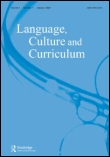
Language Culture and Curriculum
Scope & Guideline
Elevating Language Learning in Cultural Contexts
Introduction
Aims and Scopes
- Intercultural Communication and Language Learning:
The journal highlights research on how intercultural communication facilitates language learning, especially in multilingual and multicultural settings. It examines the dynamics between language use and cultural identity, fostering an understanding of how learners navigate diverse linguistic environments. - Curriculum Development and Pedagogy:
A core focus is on innovative curriculum design that integrates language and cultural competencies. The journal discusses pedagogical approaches that support language acquisition while promoting cultural awareness and inclusivity. - Multilingualism and Language Policy:
The journal addresses issues related to multilingual education and language policy, analyzing how different educational systems accommodate linguistic diversity and the implications for teaching and learning. - Technology in Language Education:
Research on the role of digital technologies in language education is emphasized, exploring how these tools can enhance language learning and cultural exchange. - Social Justice and Equity in Language Education:
The journal is committed to examining issues of equity and social justice within language education, focusing on marginalized voices and advocating for inclusive practices that support all learners.
Trending and Emerging
- Translanguaging Practices:
There is a growing interest in translanguaging as a pedagogical strategy, emphasizing its role in supporting multilingual learners and enhancing language awareness. This trend reflects a broader recognition of linguistic diversity as a resource in educational contexts. - Digital Technologies and Language Learning:
The integration of digital technologies in language education is increasingly highlighted, showcasing how these tools can facilitate language learning, enhance engagement, and promote intercultural communication among students. - Culturally Responsive Pedagogy:
Research on culturally responsive teaching practices is on the rise, focusing on how educators can create inclusive classrooms that acknowledge and celebrate students' cultural backgrounds, thereby improving educational outcomes. - Social Justice and Language Equity:
There is an emerging trend towards examining social justice issues within language education, advocating for equitable practices that address the needs of marginalized groups and promote linguistic rights. - Intercultural Competence Development:
The journal is increasingly focusing on the development of intercultural competence among language learners, recognizing its importance in preparing students for global citizenship and effective communication in diverse contexts.
Declining or Waning
- Traditional Language Teaching Methods:
There is a noticeable decrease in research centered on traditional language teaching methodologies, as the journal shifts towards more innovative and inclusive pedagogical strategies that emphasize communicative competence and intercultural awareness. - Standardized Language Assessment:
The focus on standardized testing and assessment practices has diminished, reflecting a broader critique of such methods in favor of more holistic and formative approaches to language assessment that consider the learner's cultural and linguistic background. - Monolingual Education Frameworks:
Research that advocates for strictly monolingual education frameworks is less prevalent, as the journal increasingly supports multilingual pedagogies and recognizes the importance of leveraging students' home languages in educational settings.
Similar Journals
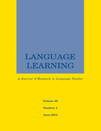
LANGUAGE LEARNING
Unlocking insights in language learning and teaching.LANGUAGE LEARNING is a premier academic journal dedicated to advancing the field of language acquisition and education, published by Wiley. With a foundation dating back to 1948, the journal has carved an esteemed niche in the academic landscape, currently holding a prestigious Q1 rank in both the categories of Education and Linguistics and Language. It proudly occupies the 9th percentile rank in the Arts and Humanities domain and the 10th percentile in Social Sciences, illustrating its influence and reach. The journal publishes high-quality research that explores various dimensions of language learning, from cognitive processes to pedagogical approaches, making it an essential resource for researchers, educators, and students alike. Although Access options are non-open, the journal remains accessible to a wide audience, reinforcing its commitment to disseminating critical insights within the academic community.
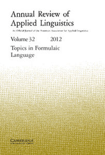
Annual Review of Applied Linguistics
Elevating scholarship in applied linguistics.The Annual Review of Applied Linguistics, published by Cambridge University Press, stands as a premier journal in the realm of linguistics and psychology, with an impressive impact factor identifying its significance: ranking in the Q1 quartile across both fields in 2023. With an ISSN of 0267-1905 and an E-ISSN of 1471-6356, this journal endeavors to provide comprehensive and insightful reviews covering an array of topics within applied linguistics, thus supporting researchers, professionals, and students in advancing their understanding and expertise. Operating from its base in Cambridge, United Kingdom, the journal has maintained a consistent commitment to scholarly excellence since its inception, accelerating discussions on critical issues and emerging research trends from 2005 to 2024. Notably, it holds a prestigious position in Scopus, ranked #26 in Language and Linguistics and #30 in Social Sciences, showcasing its influence and contribution to the scholarship in the field. The Annual Review of Applied Linguistics thus stands as an essential resource for anyone engaged in linguistic research and application.

TESL Canada Journal
Elevating ESL Pedagogy with Groundbreaking ResearchTESL Canada Journal, published by TESL Canada, serves as a vital resource for researchers, educators, and practitioners in the field of English as a Second Language (ESL) and applied linguistics. With its commitment to advancing scholarship and best practices in language education, this esteemed journal fosters a platform for the dissemination of high-quality research and innovative pedagogical approaches. Although it operates without open access, its comprehensive articles and reviews offer valuable insights into current trends and challenges faced by ESL educators across Canada and internationally. The journal is dedicated to promoting a deeper understanding of language acquisition processes and instructional methodologies, contributing significantly to the professional development of its readership. Located in Burnaby, Canada, the journal aims to bridge the gap between theory and practice, making it an indispensable source for educators and researchers looking to enhance their expertise in ESL education.
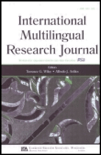
International Multilingual Research Journal
Bridging cultural contexts through cutting-edge language research.The International Multilingual Research Journal, published by Routledge Journals, Taylor & Francis Ltd, is a leading platform for the dissemination of innovative research in the fields of Education and Linguistics. With an impact factor reflecting its rigorous academic standards and a Q1 ranking in both relevant categories, this journal is dedicated to advancing the understanding of multilingualism and its implications globally. It serves as an essential resource for researchers, educators, and practitioners who seek to explore the complexities of language and learning across diverse cultural contexts. Since its inception in 2010, the journal has converged a wealth of scholarly articles that address contemporary issues in language use and pedagogical practices. The journal adheres to the highest research integrity standards and promotes open dialogue among scholars, making it a vital tool for those engaged in this expanding field. With its strong positioning in prestigious databases like Scopus, the International Multilingual Research Journal is committed to enriching the academic community and fostering interdisciplinary collaborations.
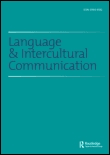
Language and Intercultural Communication
Enriching Perspectives in Language and Intercultural StudiesLanguage and Intercultural Communication is a leading peer-reviewed journal published by Routledge Journals, Taylor & Francis Ltd, based in the United Kingdom. With an ISSN of 1470-8477 and an E-ISSN of 1747-759X, this esteemed publication has established itself as a vital resource in the fields of Communication and Linguistics, boasting an impressive Q1 classification in both categories as of 2023. The journal's scope encompasses a broad range of topics related to language and its role in intercultural contexts, making it an essential platform for researchers, professionals, and students alike who wish to contribute to and learn from the latest scholarly discussions. Even without an open-access option, its high impact factor and strong Scopus rankings, which place it in the 87th percentile for Linguistics and Language, affirm its significance in shaping contemporary dialogue. As we move towards 2024, Language and Intercultural Communication continues to foster academic exchanges that challenge, expand, and enrich understanding across diverse linguistic and cultural landscapes, making it a must-read for anyone interested in the intersection of language and culture.

Colombian Applied Linguistics Journal
Exploring the richness of language in Latin America.Colombian Applied Linguistics Journal, published by UNIV DISTRITAL FRANCISCO JOSE DE CALDAS, serves as a vital platform for the advancement of knowledge in the field of applied linguistics, particularly within the Latin American context. Since its inception in 2003, the journal has embraced an Open Access model, ensuring that cutting-edge research is readily accessible to scholars, practitioners, and students alike. With a focus on topics including language acquisition, language policy, and bilingual education, the journal contributes to the understanding of linguistic diversity and its practical applications in educational settings. The Colombian Applied Linguistics Journal is dedicated to fostering dialogue and disseminating research that bridges theory and practice, thus playing a crucial role in shaping contemporary discourses in linguistics and education. Located in Bogotá, Colombia, the journal encourages submissions from both national and international authors, enhancing its reputation as a key player in the global linguistic community.
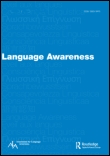
Language Awareness
Connecting Theory and Practice in Language UseLanguage Awareness is a leading academic journal published by Routledge Journals, Taylor & Francis Ltd, focusing on the intersection of language, education, and linguistic theory. Since its inception in 1992, this esteemed journal has provided a platform for scholarly discourse and research advancement, boasting a strong impact within its field, as indicated by its Q1 quartile rankings in both Education and Linguistics and Language as of 2023. The journal's commitment to promoting awareness and understanding of language use in diverse contexts is highlighted through rigorous peer-reviewed articles that cater to researchers, practitioners, and educators. With an impressive positioning in various Scopus categories—ranking 95th in Arts and Humanities, and 111th in Social Sciences—it ensures access to high-quality research that influences both pedagogy and linguistic methodologies. Although it does not offer Open Access options, its content remains essential for those passionate about linguistic research and educational innovation.

Yazyk i Kultura-Language and Culture
Illuminating the Interplay of Words and WorldsYazyk i Kultura - Language and Culture is a distinguished academic journal dedicated to the exploration of linguistic and cultural issues across various contexts. Published by TOMSK STATE UNIVERSITY, this journal serves as a vital resource for researchers, scholars, and students interested in the intricate interplay between language and culture. With an ISSN of 1999-6195 and an E-ISSN of 2311-3235, it engages a global community in disseminating high-quality research articles, reviews, and theoretical discussions. Although the journal is not categorized as Open Access, it ensures that its contents contribute significantly to the academic discourse within the fields of linguistics, cultural studies, and social sciences. With a commitment to promoting scholarly research, Yazyk i Kultura is positioned to shape contemporary conversations about language's role in cultural dynamics, making it an essential outlet for those dedicated to advancing understanding in this interdisciplinary domain.
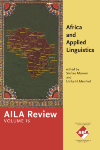
AILA Review
Exploring the nuances of multilingualism and linguistics.AILA Review, published by John Benjamins Publishing Co, stands as a pivotal resource within the field of linguistics and language studies. With an ISSN of 1461-0213 and an E-ISSN of 1570-5595, this journal is dedicated to fostering innovative research and scholarship that advances the understanding of language in its diverse forms and applications. Spanning significant years from 2003 to 2016 and 2018 to 2024, AILA Review has established itself with a commendable reputation, reflected by its Q2 ranking in Linguistics and Language and notable Scopus rankings, positioning it in the 73rd percentile among Arts and Humanities. As an essential forum for researchers, professionals, and students alike, the journal invites high-quality contributions that engage with theoretical and practical aspects of language acquisition, multilingualism, and applied linguistics, enhancing discourse in these vital areas of study. Although not an open-access journal, its commitment to quality ensures that publications are widely recognized and cited, fostering impactful scholarly exchanges.
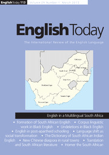
English Today
Shaping Linguistic Discourse for TomorrowEnglish Today is a premier academic journal published by Cambridge University Press, renowned for its contributions to the field of linguistics and language since its inception in 1985. With an impressive impact factor and categorized in the top Q1 quartile for both linguistics and language categories, it ranks notably within the 84th percentile for Arts and Humanities and 82nd percentile for Social Sciences in Scopus rankings. The journal serves as a vital platform for researchers, professionals, and students, offering cutting-edge research, insightful reviews, and critical discussions on contemporary issues in English language studies. Although it is not open access, the journal maintains a commitment to academic rigor and relevance, making it an essential resource for those dedicated to advancing their understanding of English language dynamics and its implications in various socio-cultural contexts. With its editorial board comprising leading experts, English Today promises to continue shaping the discourse in linguistics and language studies through to 2024 and beyond.